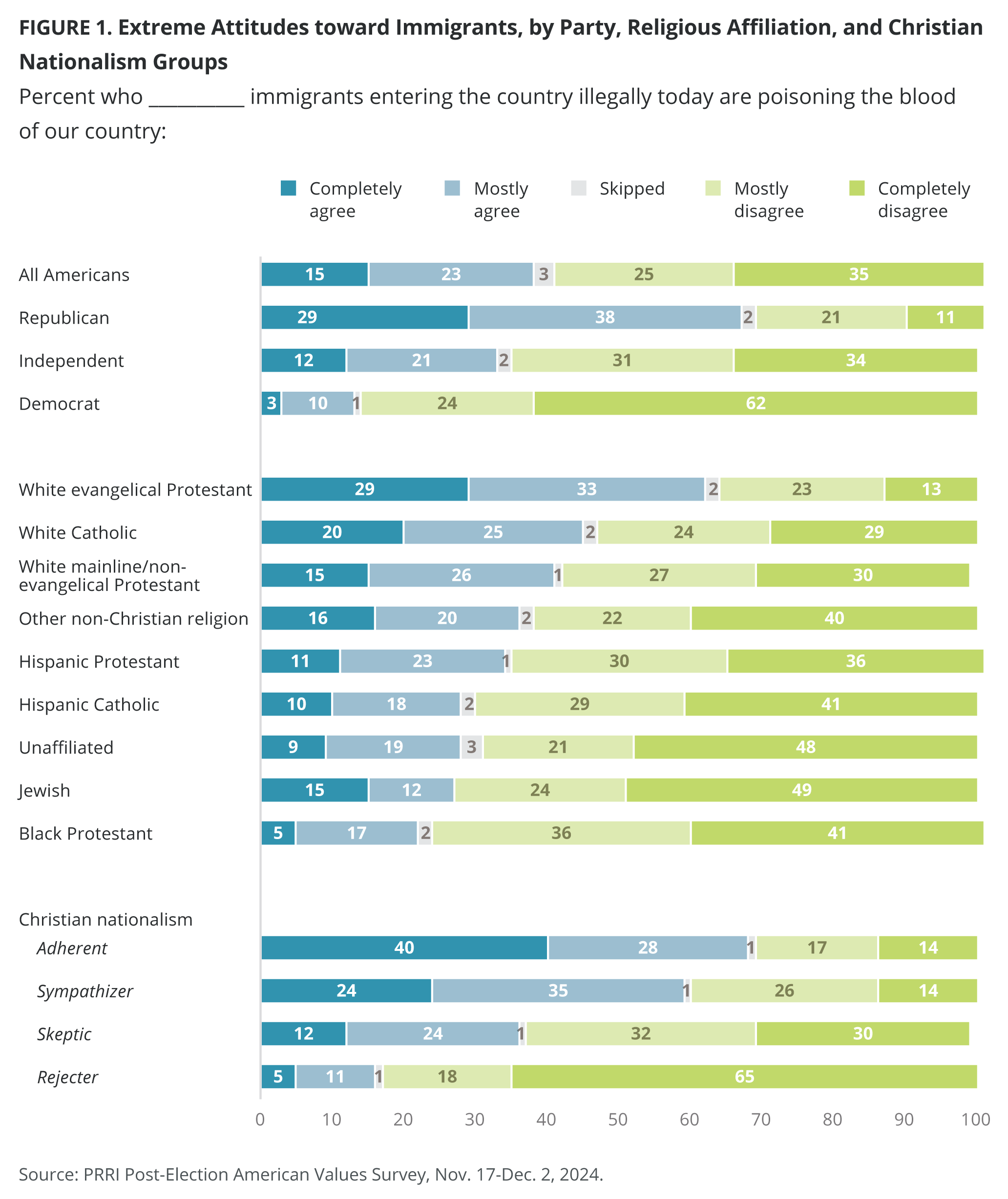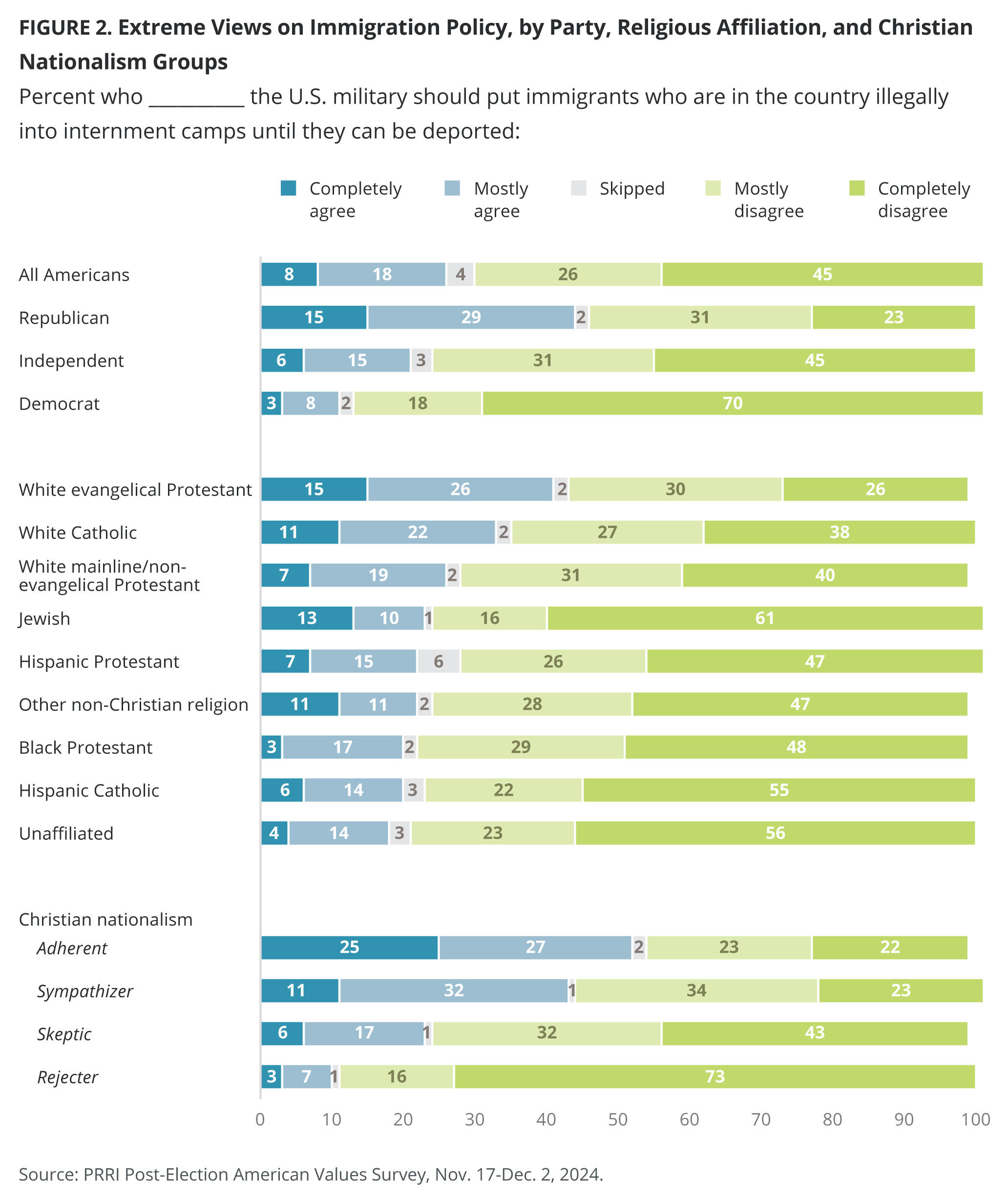President-elect Donald Trump has outlined an ambitious agenda to address undocumented immigration upon taking office on January 20, 2025. Central to his plan is the potential initiation of mass deportations, aiming to remove millions of undocumented immigrants from the United States. As the incoming Trump administration prepares to enact these measures, debates continue over logistical challenges, including the need for substantial resources and potential resistance from states and local communities. Trump’s 2025 deportation plans align with the portion of the American public that prioritizes stricter immigration enforcement, but they may face considerable opposition from the majority of Americans. This Spotlight Analysis examines recent data on Americans’ public attitudes toward immigrants more generally and views on extreme immigration policy.
PRRI’s 2024 Post-Election Survey asked to what extent Americans agree with the following statement “The immigrants entering the country illegally today are poisoning the blood of our country.” Nearly four in ten Americans say they either completely agree (15%) or mostly agree (23%) with the statement, compared with the majority who completely disagree (35%) or mostly disagree (25%).
There are substantial differences by party and religious affiliation. Two-thirds of Republicans (67%) agree with this statement, compared with one-third of independents (33%), and just over one in ten Democrats (13%).
Except for white evangelical Protestants (62%), no other religious group has a majority of members who agree that immigrants are “poisoning the blood of our country.” A plurality of white Catholics (45%) and white mainline/non-evangelical Protestants (41%), as well as about one-third of other non-Christian Americans (36%) agree with this statement. Roughly one in four Hispanic Catholics (28%), religiously unaffiliated Americans (28%), Jewish Americans (27%), and Black Protestants (22%) agree.
Support for Christian nationalism is positively correlated with these views. The majority of people who qualify as Christian nationalism Adherents (68%) and Sympathizers (59%) agree that “immigrants entering the country illegally today are poisoning the blood of our country, ” compared with 36% of Christian nationalism Skeptics and 16% of Rejecters.

Regarding mass deportation, the Post-Election Survey also asked Americans whether the “U.S. military should put immigrants who are in the country illegally into internment camps until they can be deported.” Just one in four Americans completely agree (8%) or mostly agree (18%), while the vast majority completely disagree (45%) or mostly disagree (26%).
Though Republicans (44%) are more than twice as likely as independents (21%) and four times as likely as Democrats (11%) to agree with the idea that the U.S. military should put immigrants who are in the country illegally into internment camps until they can be deported, there is no majority support among Republicans.
There is no majority support for this proposal among people of faith, either. Four in ten white evangelical Protestants (41%), about one-third of white Catholics (33%), one in four white mainline/non-evangelical Protestants (26%), and about two in ten Jewish Americans (23%), Hispanic Protestants (22%), other non-Christians (22%), Black Protestants (20%), Hispanic Catholics (20%), and religiously unaffiliated Americans (18%) agree.
A slim majority of Christian nationalism Adherents (52%) agree with the idea that the U.S. military should put undocumented immigrants into internment camps until they can be deported, compared with 43% of Sympathizers, 23% of Skeptics, and 10% of Rejecters.

Trump’s plans to deport undocumented immigrants underscore the deep divisions in public opinion on immigration policy. While these plans resonate with certain segments of the population, particularly Republicans, white evangelical Protestants, and Christian nationalism supporters who prioritize stricter enforcement and border security, they face significant opposition from most Americans, highlighting widespread resistance to extreme immigration measures and the complex dynamics between public sentiment and immigration policy priorities.